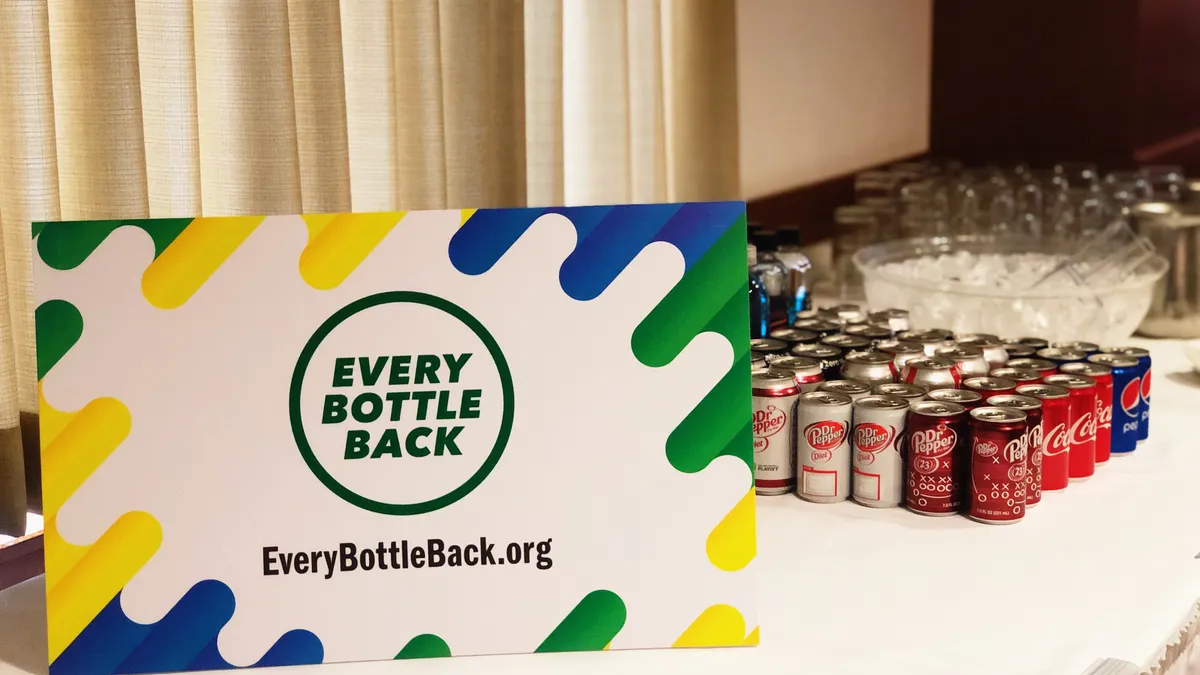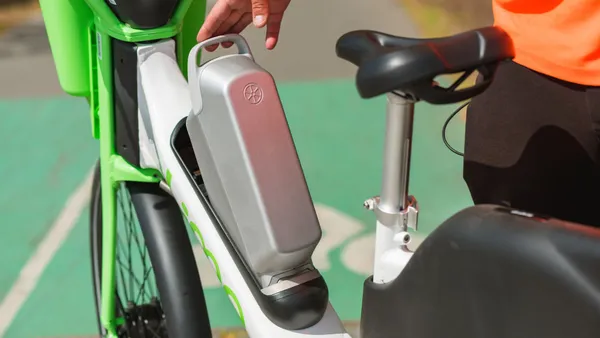Dive Brief:
- The Coca-Cola Company, Keurig Dr Pepper, and PepsiCo announced on Tuesday the launch of the "Every Bottle Back" initiative, an effort to "reduce the industry's use of new plastic." The leading beverage companies are partnering with the World Wildlife Fund (WWF), The Recycling Partnership (TRP), and Closed Loop Partners as part of a circular economy push.
- Spearheaded by the American Beverage Association (ABA), the initiative is expected to direct the equivalent of $400 million to both TRP and Closed Loop Partners through a $100 million industry fund matched three-to-one by grants and investors. WWF's ReSource activation hub will help measure the initiative's progress.
- Beverage companies pledged to improve the quality and availability of recycled plastics in key regions, namely the Northeast, Southeast, Midwest, and Texas. A public education campaign and voluntary product labeling will also seek to help consumers understand the recyclable nature of the products they purchase.
Dive Insight:
The new initiative appears to bow to the success of environmental groups in characterizing plastic bottles as "single-use," while avoiding endorsing government policy measures targeting bottles or extended producer responsibility (EPR).
TRP CEO Keefe Harrison told Waste Dive her organization is not necessarily opposed to such policies, but feels private sector efforts are also key to addressing plastic pollution. "It's too easy to go for the silver bullet," she said.
The beverage industry has poured substantial resources into voluntary recycling efforts as leading members have expressed resistance to regulation. Lately, bans on single-use plastic products are becoming more popular both domestically and internationally, and the packaging industry is taking notice. Bottles have largely avoided the push for bans ensnaring plastic bags and straws, but are still a target for broader regulation.
"We take our responsibility to our planet seriously and so do our consumers," Katherine Lugar, president and chief executive officer for ABA, said at a press conference in Washington, D.C. on Tuesday. Lugar acknowledged the frustration consumers feel when they see images of marine debris and litter, and argued that leading beverage companies are in the best position to address that growing problem.
That isn't impressing many environmental groups and policymakers. Rep. Alan Lowenthal and Sen. Tom Udall, both Democrats, said in a statement that the container industry needs to produce "real, concrete action" to be taken seriously. The lawmakers are drafting federal legislation to address "the plastic waste crisis," which could push for both EPR and nationwide container deposits.
Greenpeace responded to the ABA announcement by noting that both Coca-Cola and PepsiCo were recently named two of the top three plastic polluters worldwide.
Susan Collins, president of the Container Recycling Institute, expressed similar skepticism, arguing that such initiatives have less impact than container deposit laws and other mechanisms for addressing the presence of plastics in the waste stream.
"Countries that have container deposit laws can have recycling rates of 80% or more," she wrote to Waste Dive, noting how major beverage companies and their trade associations "have historically and consistently thwarted" such legislation in a number of states. During the latest high-profile legislative debate in California, ABA landed on a neutral position for stalled EPR legislation and pushed for changes in another recycled content bill mandated by the state's governor in part for being too lax.
Despite some of these shifts, the beverage industry's stance on bottle bills remains vague. Similar to many recycling companies, it has a history of opposition. Audio leaked to the Intercept earlier this month revealed that Coca-Cola has sought to undermine bottle bills as recently as January.
Lugar declined to take a stance on the issue at yesterday's event, repeatedly asserting that ABA is interested in working with policymakers to address plastic pollution.
Harrison told Waste Dive bottle bills "could be part of" a larger effort, but argued that TRP is at the forefront of working with the beverage industry to address the problem and plans to release a comprehensive policy initiative soon. Earlier this month, Pepsi's philanthropic arm and TRP announced they had raised $25 million for U.S. recycling, only one year into a five-year challenge.
But there's still a long way to go. A new TRP report outlining circular economy plans found that the supply of recycled PET is estimated to be 1 billion pounds short of expected demand by 2025. Beverage companies will need to see a dramatic shift in the amount of material returned via recycling to meet their sustainability targets. In 2017, the U.S. recycling rate for PET bottles was 29.2%.














